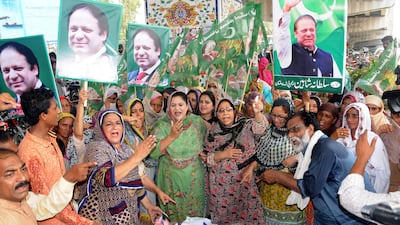In a post-truth world, consider a post-coup country – Pakistan. Its image is morbidly frozen in the global eye. This is why the ouster of a democratically elected prime minister by a bench of judges doesn’t shock so much as cause a ripple of sadness. As a country that has tried multiple models of political and military governance in 70 years, the news from Pakistan just doesn't arouse outrage any more.
Instead, the worldly-wise admit to feeling relieved the dismissal of prime minister Nawaz Sharif hasn’t resulted in yet another military coup. And why, they ask, should Mr Sharif have been expected to serve out a full five-year term when none of his predecessors managed this feat?
Such weary acceptance of Pakistan’s political dysfunction would be tragic if it hadn’t seemed inevitable and for so long. Systemic frailty has long marked its political history. Barely a week after the country came into being in August 1947, the federal authorities sacked an elected provincial government on the watch of Pakistan’s founder Mohammad Ali Jinnah. Many believe it set the tone for what was to come. Between 1951 and 1958, Pakistan ran through six prime ministers. Most of them were highhandedly dismissed by the head of state, who then bore the vaguely colonial title of governor-general. The political defenestrations generally occurred with the military establishment’s approval if not its active encouragement. That era ended in a military coup, the first of three successful attempts. And so it was that in its infancy Pakistan created a template for adulthood.
The crucial early period for a new country should have been bright with hope and brimming with promise, but in Pakistan’s case it was not used to build institutions. Or at least, not the ones that would allow for good governance and democratic accountability. For all that Pakistan worked on nation-building in its first 15 years as a sovereign entity – it declared a national language (Urdu), a national flower (jasmine), approved an anthem, issued its first postage stamp, established universities, the Scouts and a national airline – due process and democratic traditions were never allowed properly to flourish and then, never for very long.
Unlike its neighbour India, where national elections were held within four years of achieving independence from Britain, Pakistan took nearly a quarter-century to get to that point. And its first elected prime minister, Zulfiqar Ali Bhutto, was ousted in a military coup in 1977 and hanged on a murder charge two years later.
All of this helps put recent events and the dominance of unelected institutions in context. The supreme court's decision to disqualify Mr Sharif from office after a corruption investigation is profoundly troubling. First, it didn’t find him guilty per se, just out of step with two articles of the constitution that require members of parliament to be “truthful” and “righteous". This is the first time a Pakistani legislator – and the prime minister, no less – has been disqualified in this way. Second, the judges dispatched Mr Sharif without a trial in which he might have argued his case. Third, the investigative team looking into the Sharif family’s wealth was seen to be politically and institutionally weighted against the prime minister, with the military intelligence services playing a major role.
Finally, it’s become clear that the court pursued Mr Sharif, but not many of the other politicians and officials implicated in the Panama Papers leak that triggered the investigation. The well-informed say the military has punished Mr Sharif for taking too broad a view of the prime minister’s powers and for daring to dream of peace with India.
Whatever the reality, the perception of selective justice, if not outright injustice, for political ends only adds to the prevailing unedifying image of Pakistan. It's seen as a mutant democracy, dangerously armed with nuclear weapons but with few political guardrails. In Tinderbox: The Past and Future of Pakistan, prominent Indian journalist-turned-politician M J Akbar described it as a "jelly state – one that cannot rise, or become a modern state, but nor can it disappear".
To some, that may sound rather extreme or the usual Indian criticism, but this much is clear: Almost no one has great expectations of Pakistan at the moment. In the United States, Donald Trump’s self-serving public musings about firing the attorney-general cause shock and horror. That's because Mr Trump may bluster and blunder in defiance of every norm of American politics, but the world still has some modest hopes of America's system of laws. Even Poland, which managed a peaceful transition from communism to democracy in just 15 years, is under pressure to continue the good work despite its right-wing government.
But for Pakistan, no one is talking of the need to maintain standards or even to establish them. That is its tragedy.


